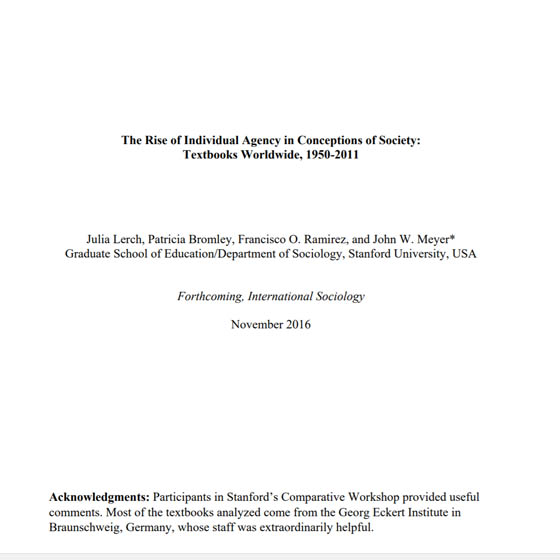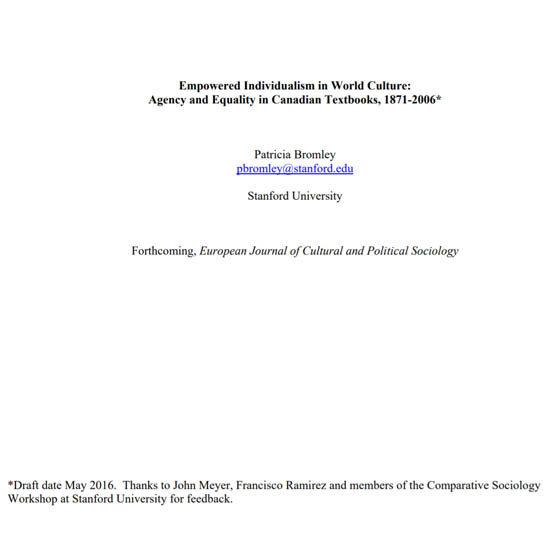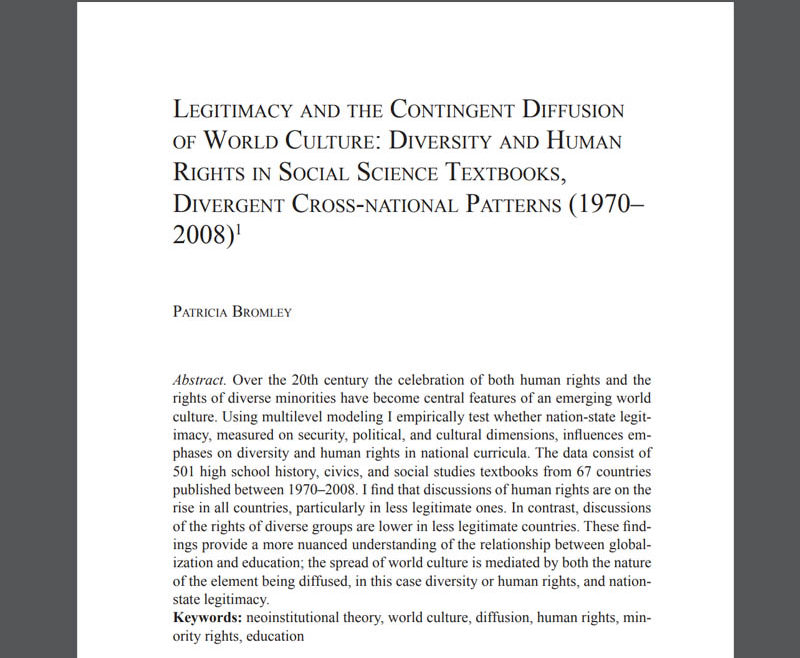Textbooks
Textbooks
Climate Change in TX & CA History Textbooks
http://www.patriciabromley.com/wp-content/themes/osmosis/images/empty/thumbnail.jpg 150 150 TrishAdmin TrishAdmin http://2.gravatar.com/avatar/e215c03fe78483cee137e5421dec4d4f?s=96&d=mm&r=gContent Analysis of Textbooks via Natural Language Processing: Findings on Gender, Race, and Ethnicity in Texas US History Textbooks
http://www.patriciabromley.com/wp-content/themes/osmosis/images/empty/thumbnail.jpg 150 150 TrishAdmin TrishAdmin http://2.gravatar.com/avatar/e215c03fe78483cee137e5421dec4d4f?s=96&d=mm&r=gIndividual and Collective Social Justice Education: Comparing Emphases on Human Rights and Social Movements in Textbooks Worldwide, 1950-2010
http://www.patriciabromley.com/wp-content/themes/osmosis/images/empty/thumbnail.jpg 150 150 TrishAdmin TrishAdmin http://2.gravatar.com/avatar/e215c03fe78483cee137e5421dec4d4f?s=96&d=mm&r=gHuman Rights as Cultural Globalization: The Rise of Human Rights in Textbooks, 1890-2013.
http://www.patriciabromley.com/wp-content/themes/osmosis/images/empty/thumbnail.jpg 150 150 TrishAdmin TrishAdmin http://2.gravatar.com/avatar/e215c03fe78483cee137e5421dec4d4f?s=96&d=mm&r=gEducation for Global Citizenship and Sustainable Development in Social Science Textbooks.
http://www.patriciabromley.com/wp-content/themes/osmosis/images/empty/thumbnail.jpg 150 150 TrishAdmin TrishAdmin http://2.gravatar.com/avatar/e215c03fe78483cee137e5421dec4d4f?s=96&d=mm&r=gThe Rise of Individual Agency in Conceptions of Society: Textbooks Worldwide, 1950-2011.
http://www.patriciabromley.com/wp-content/uploads/2017/11/TheRiseOf.jpg 560 560 TrishAdmin TrishAdmin http://2.gravatar.com/avatar/e215c03fe78483cee137e5421dec4d4f?s=96&d=mm&r=gAbstract
A broadly recognized sociological insight is that rising levels of individualism increasingly characterize a growing number of countries. We examine the extent to which schooling is altered by, and transmits, this core cultural shift. We analyze 476 secondary school social science textbooks from 78 countries from 1950 to 2011 to see whether they increasingly portray society as made up of agentic individual actors of all sorts (e.g., children, women, minorities). We find emphases on older social institutions remain stable, but there are striking worldwide increases in emphases on people, especially ones empowered with rights. This global peopling of social science instruction, especially strong in the recent neoliberal decades, characterizes every type of country and textbook we can distinguish, and occurs over and above other features of books and countries.
A Tale of Two Worlds: The Inter-State System and World Society in Social Science Textbooks, 1950-2010
http://www.patriciabromley.com/wp-content/uploads/2017/11/ATaleOf.jpg 560 560 TrishAdmin TrishAdmin http://2.gravatar.com/avatar/e215c03fe78483cee137e5421dec4d4f?s=96&d=mm&r=gAbstract
There is a great and longstanding divide in visions of the international arena. Some assert thatstates are the most relevant actors in international politics, and others emphasize the importance of non-state actors as vehicles through which shared ideas and identities are enacted. Typically, cross-national scholarship adopts one of these positions and seeks to support the attendant theoretical claims; our approach is entirely different. We treat these varied conceptions of the international arena not as antecedent explanatory frameworks, but rather as outcomes to be explained in their own right. To this end, we draw on data consisting of 539 high-school social science textbooks (history, civics, social studies, and geography) from 73 countries published between 1950 and 2011, coded to shed light on how the international arena is discussed innational education systems. We use multilevel modeling to determine how characteristics of textbooks and countries are linked to different visions of the international arena. Stronger national emphases in books promote a vision of the interstate system, as does a country’s level of democracy. Emphases on world society emerge particularly in recent decades and in books and countries most exposed to educational and social globalization. Our findings provide initial support for arguments that world society and the interstate system are distinct, leading to multiple forms of inequality in the international arena.
Empowered Individualism in World Culture: Agency and Equality in Canadian Textbooks, 1871-2006.
http://www.patriciabromley.com/wp-content/uploads/2017/11/EmpoweredIndividualism.jpg 560 560 TrishAdmin TrishAdmin http://2.gravatar.com/avatar/e215c03fe78483cee137e5421dec4d4f?s=96&d=mm&r=gAbstract: The sacred status of individuals is a central pillar of world culture in research on education and beyond. The intended socialization of students is increasingly to become empowered individuals that respect human equality and diversity in a globally-interconnected world. At the same time, we have little understanding of what exactly the concept of individual empowerment means or how to capture it empirically. This study builds on prior observations about the growing status of individuals by delineating the rise of two separate but related dimensions of empowerment – agency and equality – and outlining the rise of these dimensions in the Canadian educational context. To this end, it draws on a unique dataset consisting of a systematically designed coding of eighty history, civics, and social studies textbooks used in Canada from 1871 to 2006. Refining the concept of individual empowerment reveals that its manifestations are shaped by the local context, in addition to the influences that come from world culture. Overall, increasingly empowered individuals and the structures they create (often organizations and associations of various types) become key actors in national and international society. Looking to the future, if taken to an extreme, expansions in individual empowerment may lead to instances of “hyper-empowerment”, where depictions and enactments of individual choice, control, and equality far outpace reasonable expectations.
Legitimacy and the Contingent Diffusion of World Culture: Diversity and Human Rights in Social Science Textbooks, Divergent Cross-National Patterns (1970-2008)
http://www.patriciabromley.com/wp-content/uploads/2017/11/Legitimacy.jpg 800 800 TrishAdmin TrishAdmin http://2.gravatar.com/avatar/e215c03fe78483cee137e5421dec4d4f?s=96&d=mm&r=gOver the twentieth century the celebration of both human rights and the rights of minorities have become central features of an emerging world culture. Although related in some respects, ideas of human and minority rights differ in their fundamental conception of society as made of either heterogeneous social
groups or universally equivalent individuals. I posit that the contradiction between universality and diversity in world culture leads to divergent patterns of diffusion into nation-states and provide evidence of this trend. The data consist of 523 high school social science textbooks from 74 countries published
between 1970 and 2008 coded for content relevant to human and minority rights. Using multilevel modeling, I find that increases in minority rights discussions occur mainly in stable democracies, in contrast to a worldwide rise in discussions of human rights. These findings contribute to studies of globalization, education, and minority and human rights by documenting the spread of global models of citizenship into national education systems and identifying limits to the diffusion of global principles.
Read the article here:
https://journals.library.ualberta.ca/cjs/index.php/cjs/article/view/17001
- 1
- 2




